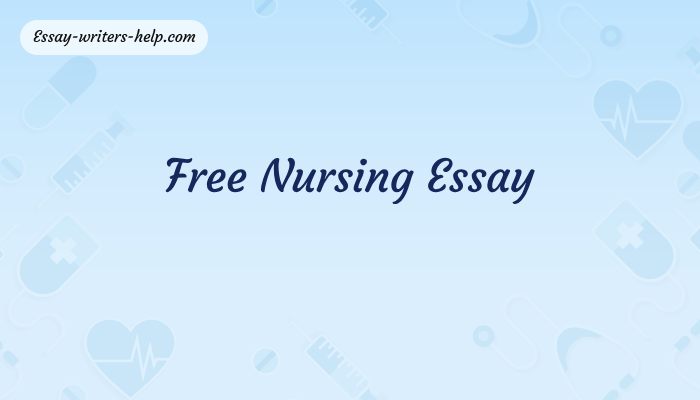What is Nursing Essay

The concept of nursing has changed along with the inquiries of society and living conditions throughout the centuries. At present, it is difficult to define nursing, but there is a set of definitions. Each of them was influenced by a number of factors: a definite historical period, social and economic level, the geographical position of the country, needs for nursing help, the number of nurses and the duties carried out by them, as well as human views and experiences of those explaining the term. However, despite the above-mentioned factors, nursing should correspond to modern professional standards, have a legislative basis, and become a distinct profession, like medicine, law, or psychology.
The first scientific definition of nursing was given by Florence Nightingale, who considered that it is an action for the use of the surrounding environment of a patient for his or her recovery. Thus, the purpose of nursing, formulated by Florence, was to create the best conditions for activating the patient’s own forces. She considered nursing to be an art and science, demanding organization, and practical and scientific preparation. Moreover, nursing as a profession differs from the profession of a physician and demands special knowledge.
Smith, M., Parker, M.E. (2014). Nursing theories and nursing practice. FA Davis Company.
Nursing is both an art and a profession. It requires special skills and abilities. Nursing is based on humanitarian and natural sciences: biology, medicine, psychology, sociology, etc. A nurse assumes responsibility and acts with appropriate authorities, directly fulfilling professional duties, and is responsible for the medical services she/he provides. She or he has the right to decide independently whether he/she needs to continue education on management, training, work in a clinic, and take steps to satisfy these requirements. The mission of nursing in society consists of helping certain people, families, and groups to develop their physical, intellectual, and social potential and to support them at an appropriate level, irrespective of the changing conditions of accommodation and work. It demands work on strengthening and preservation of health, as well as the prevention of diseases (Jones and Bartlett Learning, 2013).
The modern philosophy of nursing is a need to change the basis of the current practice. The organization of nursing is based on the performance of doctors’ prescriptions and care, based on the individual needs of a patient. The new concept of nursing will replace the old one, dictated by the hierarchical and bureaucratic system. The new concept of a highly skilled practicing nurse requires the acquisition of knowledge and skills, necessary for planning, implementation, and estimation of nursing results, and meeting the needs of a definite patient. Thus, there is a particular emphasis on the uniqueness of the contribution of nursing to the recovery of a patient (Smith & Parker, 2014, p. 93).
To sum up, nursing is an important part of the health care system. At present, nursing staff composes the most numerous category of health care workers. Nursing is a separate science and a distinct profession. Special medical educational establishments teach nurses both to the scientific grounds of the profession and to practice of nursing skills. Therefore, a nurse is a qualified specialist, sharing the nursing philosophy and having the right to work as a nurse. Like any other profession, nursing is also based on ethical and moral qualities, which are as important as practical skills. All over the world, nurses declare their desire to make a professional contribution to the creation of a qualitatively new level of medical care. In the conditions of global and regional, social and economic, political and national transformations, nurses see their role in society as tutors, teachers, and patient lawyers.
Jones and Bartlett Learning, LLC. (2013). The profession of nursing. Retrieved from http://samples.jbpub.com/9781449649029/46066_CH01_6031.pdf